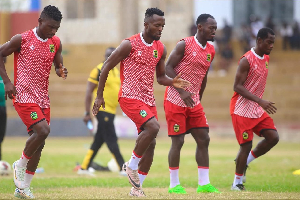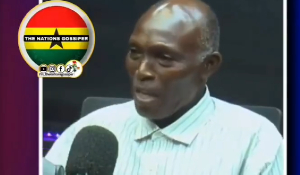Ishmael Mensah Blog of Tuesday, 24 December 2024
Source: Ishmael Mensah
Reasons for Ghanaians to oppose inciting fear from any pulpit

Archbishop Nicholas Duncan-Williams recently used his sermon to ask his congregation to join him in prayer for the departing President, H.E. Nana Addo Dankwa Akufo-Addo, in yet another example of the alarming rhetoric coming from some of our pulpits.
He said in the prayer that the President's departure would be orderly and not chaotic. This could seem like a kind gesture at first, but below it is a troubling trend of inciting anxiety under the cover of spiritual wisdom.
To be clear, Ghana is one of Africa's strongestholds of democracy and peace. We have been shifting power between political parties and leaders for decades without devolving into the anarchy that befalls many countries. The world has looked up to our democracy as a model. Duncan-Williams's remarks and those like them quietly erode this heritage by sowing doubt and dread where none previously existed.
This is not a singular occurrence. The practice of some "men of God" posing as spiritual leaders by foretelling disaster, anarchy, or doom has become concerning. They assert that they have divine insight into the alleged sinister developments that endanger Ghana, yet these declarations frequently only serve to increase unwarranted anxiety and tension among Ghanaians.
Why should a country that has repeatedly demonstrated its ability to undergo peaceful changes be reminded of chaos that only exists in the minds of so-called prophets?
In actuality, these statements serve more to enhance the reputation of individuals who make them than to demonstrate true concern for the country. These preachers want to seem indispensable to their flocks by portraying themselves as guardians of divine intervention. In order to establish themselves as the answer, they incite anxieties and fabricate issues where none exist. This conduct is dishonest.
Ghana's tranquility is not a coincidence. It is the outcome of the sacrifices and hard labor of Ghanaians who value democracy, communication, and respect for one another. It is upheld by the united desire of a people dedicated to peace rather than by terrifying prophecies.
Furthermore, such rhetoric runs the risk of having practical repercussions. They instill fear and mistrust in the populace by constantly implying that anarchy is on the horizon. This could cause needless splits and perhaps elicit responses from people who see such statements as actual warnings.
Dismissing these declarations as innocuous religious observances is insufficient because they have the potential to disrupt Ghana's ongoing relative tranquility.
As a culture, we need to recognize and denounce these strategies for what they are: destructive. Instead than inciting dread under the pretense of spiritual foresight, religious leaders ought to concentrate on fostering harmony, optimism, and positivism. Ghanaians must also continue to be watchful and oppose such initiatives.
Let's restate our dedication to the democratic values and nonviolent customs that characterize us. We say enough to the men of God who incite terror with their platforms. Better is what our country needs.














